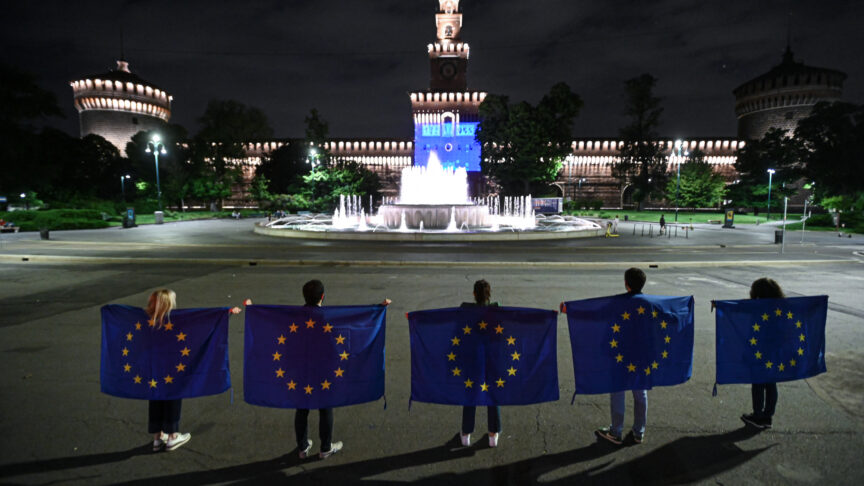The case for a confederal Europe
The EU should ensure that all willing and able European democracies have a clear and realistic path to membership or an alternative form of cooperation. Europe’s future depends on it.
I am an EU nerd. As a young civil servant, I was involved in negotiating the Amsterdam, Nice, and Lisbon treaties. I have always been fascinated by enlargement and institutional reform. I am an advocate of both widening and deepening. I wrote my PhD on flexible integration – multi-speed, variable geometry, and à la carte. I concluded that, essentially, there is no need for member states to do everything at the same time. As far as I am aware, no one else has been both a note-taker and a speaker in the European Council. I have seen it all: crisis and drama, doorstep and backroom, all-nighters and low-hanging fruit.
I tell you this because, when EU leaders gather in Brussels this week, the menu will be set with the most important enlargement decisions since the end of the cold war. The decisions they make will shape the future of Europe for a long time to come. This is less about legal technicalities and more about geopolitics and the European Union’s capacity to act. Enlargement should happen sooner rather than later. At the same time, we need to ditch traditional paths to membership.
***
Russian President Vladimir Putin’s attack on Ukraine has permanently split Europe. On one side of the ideological fence is an isolated, authoritarian, and aggressive Russia that continues to think and act in terms of spheres of interest. On the other side are 40 European states – ranging from Georgia, Ukraine, and Moldova through the Western Balkans to Ireland and the United Kingdom. Most of these countries believe in democracy, international law, and cooperation.
Fundamentally, this week is about how to organise a new Europe. The key is to ensure that all willing and able European democracies have a clear and realistic path to membership or, if they do not want to join, an alternative form of cooperation. There are many ways to do this. My suggestion is to create a confederal Europe that has three tiers and is flexible and open to all willing and able European states. These three tiers are: the European Union; the European Community; and the European Area.
This model is inclusive, not exclusive. Which tier a country joined would depend on its own choices and its capacity to meet the criteria.
Three tiers
Under this model, the EU would continue as is. Its institutional structure would remain the same. Decision-making would become more efficient as there would be no more requirement for unanimity on all issues. The union would become more flexible while maintaining its policy focus. The EU is both a regulator and an actor. It has no finalité; it is a process. I do not see a need to convene an intergovernmental conference on this change in approach. The EU would make the necessary institutional changes by using the so-called passerelle clause.
The European Community would essentially be made up of countries that were negotiating accession, had applicant status, or had expressed a desire to join the union. The aim would be to bring them closer to EU decision-making structures and institutions early on. This would include the biannual joint European Council, ministerial meetings, and participation in Council working groups without voting rights. These countries would have more formal links to the European Parliament and the European Commission. They should also adopt key policies, such as the European Green Deal and the Common Foreign and Security Policy, at an early stage.
This is about uniting European countries and leaving Russia outside until it abides by basic international law
The European Area would include countries that did not plan to join the EU in the near future. They include the UK, Switzerland, Iceland, Norway, and Lichtenstein. Here, the focus should be on economic and security cooperation, as well as closer institutional linkages. The leaders of all 40 countries should meet at least once a year.
Similar models have been suggested before. My aim is to speed up enlargement and create a structure of engagement that would appeal to not just the willing and able but also the unwilling and unable. This is about uniting European countries and leaving Russia outside until it abides by basic international law.
Peace, prosperity, and stability
Enlargement has always been about peace, prosperity, and stability. One should never underestimate the transformative power of membership – be it economic or political. Some EU enlargements might have seemed easier than others, but all of them involve long and complicated negotiations.
In the EU, there have traditionally been countries that support enlargement and those that are reluctant to do so. This time, there is no choice. Indecision will lead to frustration and instability. There is no space for petty, low-level tinkering or domestic politics. This is about high politics, peace, and the future of Europe.
The EU needs to be prepared to accommodate more members sooner rather than later. Yes, this will mean difficult decisions and compromises. But the truth is that enlargement is the best geopolitical tool in a new European security order. The EU has the strategic autonomy and historic obligation to engage in it. A confederal Europe would provide an instrument for doing so gradually but without hesitation.
Alexander Stubb is an ECFR Council member and director and professor at the European University Institute in Florence and former prime minister of Finland.
The European Council on Foreign Relations does not take collective positions. ECFR publications only represent the views of their individual authors.
